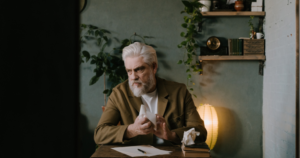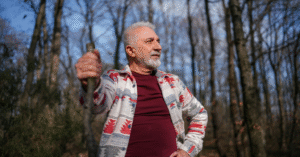There’s a fine line between selflessness and self-sacrifice. Often, we find ourselves saying “yes” when, in reality, we should be saying “no”.
Saying “no” doesn’t mean you’re unkind or selfish. Sometimes, it’s the most loving thing you can do for yourself.
Understanding when it’s time to decline can save you from unnecessary stress, overcommitment, and even burnout.
Here are eight moments in life when saying “no” is actually the kindest act of self-love. Let’s dive right in and learn how to effectively prioritize your needs without feeling guilty about it.
1) When it’s about preserving your mental health
Life can be a whirlwind of tasks, responsibilities, and commitments. And sometimes, the weight of it all can take a toll on your mental health.
When you’re stretched thin and feeling overwhelmed, it’s crucial to understand that it’s okay to say “no” to additional responsibilities.
Whether it’s an extra project at work, a social gathering, or even a family obligation, declining can give you the breathing space you need to recuperate and re-energize.
Remember, your mental health is paramount. If something threatens to compromise it, kindly but firmly say “no”. It’s not about being selfish; it’s about taking care of yourself.
And in the long run, this can actually make you more productive and happier in your personal and professional life.
2) When it conflicts with your personal values
There’s a personal story I’d like to share. Once, I was asked to handle a project at work that went against my personal values. The project was lucrative, but it required me to compromise on principles that I hold dear.
I struggled with the decision. The professional in me was tempted by the potential monetary gain and the prestige that came with the project. But the personal side of me felt uncomfortable and conflicted.
In the end, I decided to say “no”. It wasn’t an easy decision, but it was the right one for me.
By declining, I stayed true to my values. I felt a sense of relief and peace that money or prestige couldn’t provide.
This experience taught me that saying “no” can sometimes be an act of self-respect. If something doesn’t align with your core values, have the courage to decline. It’s one of the kindest things you can do for yourself.
3) When you’re already overcommitted
In our fast-paced world, multitasking is often celebrated as a valuable skill. However, research suggests that trying to juggle too many tasks can actually decrease productivity.
Our brains are not designed to handle multiple tasks simultaneously. When we switch between tasks, it takes our brain time to refocus, which can lead to mistakes and decreased efficiency.
So, if you’re already swamped with tasks and someone asks you to take on another commitment, consider saying “no”. Overcommitting can lead to stress, burnout, and a decrease in the quality of your work.
Prioritizing your tasks and managing your time effectively is not just about productivity. It’s also about maintaining your well-being. Don’t be afraid to decline additional tasks if you’re already at capacity. You’re not being rude; you’re being smart.
4) When it’s not a priority
Every day, we’re faced with countless decisions and requests. Some of these align with our goals and priorities, while others don’t.
It’s crucial to identify what truly matters to you. If a request doesn’t align with your priorities or help you progress towards your goals, it might be best to decline.
Saying “no” in such instances isn’t about being difficult or uncooperative. It’s about protecting your time and energy for what truly matters.
Remember, time is a finite resource. Use it wisely by focusing on your priorities and saying “no” to distractions. Your future self will thank you.
5) When you need to care for your physical health
Our bodies have a unique way of communicating with us. They tell us when we’re pushing too hard, not getting enough rest, or neglecting our well-being. But it’s up to us to listen.
If you’re feeling physically drained or unwell, and yet another commitment looms on the horizon, it might be time to say “no”. It’s not a sign of weakness, but an act of kindness towards yourself.
Health is a treasure that we often take for granted until it’s compromised. Don’t wait for that to happen. If your body is signaling you to slow down, honor that signal.
Decline that extra commitment, take a step back, and allow yourself the time and space to rest and rejuvenate. After all, your health is your wealth. Saying “no” today might mean being able to say “yes” to many more opportunities in the future.
6) When it’s time to set boundaries
There was a time in my life when I would say “yes” to everything. I feared being seen as unhelpful or unkind. But over time, this led to feelings of resentment and exhaustion.
I realized that in my quest to please everyone, I was neglecting my own needs. I was allowing others to overstep my boundaries.
So, I decided to change. I started setting boundaries and saying “no” when needed. It wasn’t easy initially. But gradually, people started respecting my time and my needs.
Setting boundaries doesn’t make you a bad person. It shows that you value your own time, energy, and well-being. And honestly, it’s one of the most empowering things you can do for yourself. So the next time you feel like your boundaries are being crossed, don’t hesitate to say “no”.
7) When it doesn’t bring you joy
Life is too short to spend on things that don’t bring you joy or fulfillment. It’s essential to fill your life with activities and commitments that align with your passions and interests.
If you’re asked to do something that doesn’t spark joy or contribute to your happiness, consider saying “no”. It’s not about being difficult; it’s about choosing joy and fulfillment over obligation.
As best-selling author Marie Kondo would say, if it doesn’t spark joy, it might be time to let it go. Choose to spend your time on things that light you up and bring you happiness. After all, life is meant to be enjoyed, not just endured.
8) When you need to be true to yourself
At the end of the day, the most important person you need to be kind to is yourself. Saying “no” can be a powerful tool in maintaining your authenticity.
If something doesn’t feel right to you, if it goes against your instincts or your sense of self, it’s more than okay to decline.
Being true to yourself is the highest form of self-respect. And sometimes, saying “no” is the purest expression of that respect. It’s not just about making space for your needs and desires, but also about honoring the person you truly are.
Final reflections: Self-kindness is key
Navigating life’s numerous demands and expectations can be challenging, and sometimes, we forget that it’s okay to put ourselves first.
Saying “no” isn’t a display of weakness or selfishness. Instead, it’s an act of self-kindness, a powerful statement that you respect and value your time, energy, and well-being.
When we say “no”, we create space for what truly matters to us. We protect our mental and physical health. We honor our values, set boundaries, and choose joy and authenticity over obligation.
In the wise words of Mahatma Gandhi, “A ‘no’ uttered from the deepest conviction is better than a ‘yes’ merely uttered to please, or worse, to avoid trouble.”
As you journey through life, remember this: it’s not just about being kind to others, but also about being kind to yourself. And sometimes, the kindest thing you can do for yourself is to say “no”.

















